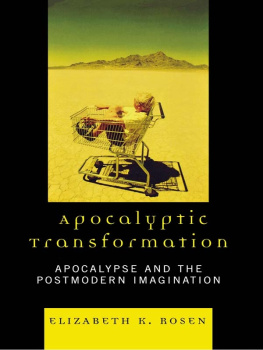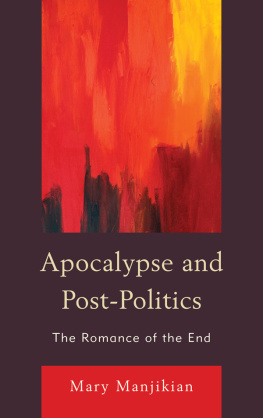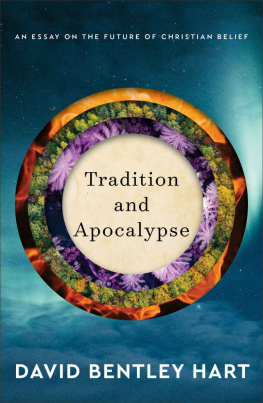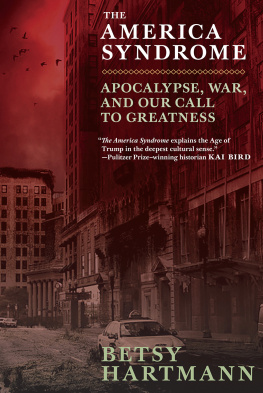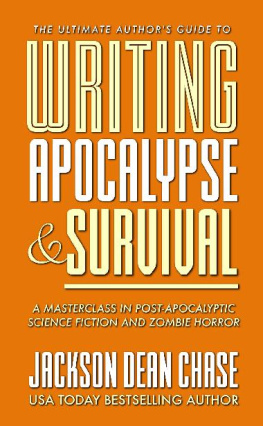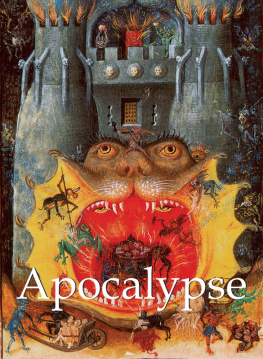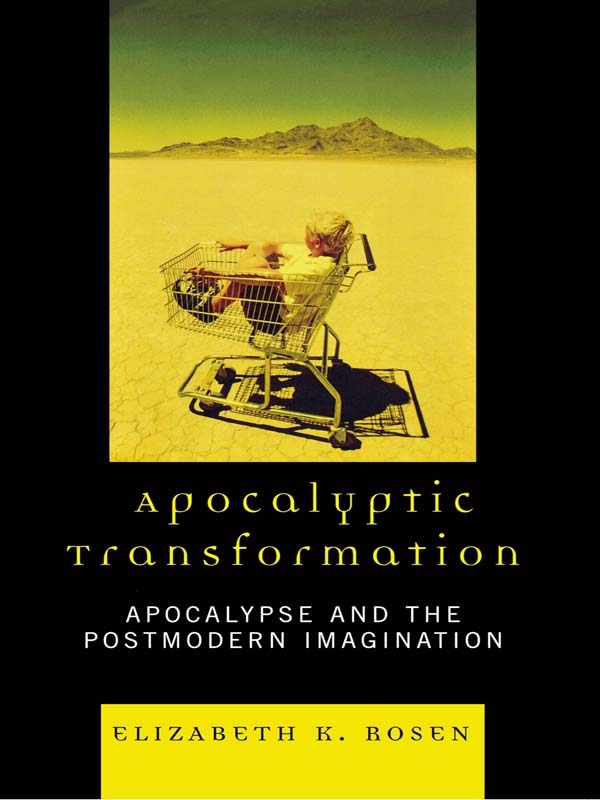Elizabeth K. Rosen is a visiting assistant professor at Lafayette College. She has published in the fields of visual, cultural, and literary studies, and previously wrote professionally for television.
EPILOGUE
W hat are we to make of the postmodern vision of apocalypse? To acknowledge that such a thing can be constructed obviously suggests a fundamental epistemological and ontological shift in the way we engage with the world. Postmodernism is intensely subjective, aggressively theoretical, unabashedly self-absorbed, and skeptical of established ideas, of value judgments and norms, of traditional aesthetic models in general and of grand narratives in particular. Such qualities seem inimical to the apocalyptic myth, even to the idea of apocalypse itself. Yet to claim that postmodernism cannot appropriate the apocalyptic myth is to deny what has already been done. It can and it has. The challenge that remains is to recognize and understand it.
Writing that apocalypse is a narrative that seeks to be nonnarrative, to get beyond the strictures of time and space, Lee Quinby suggests one tool we might use to understand postmodern apocalypse. For surely if postmodernists do anything, they seek to get beyond the limits of time and space, in art if not in life. They seek to strip away the fictions that govern our lives, to expose the metaphoric structures that lie under our way of understanding the world and the narratives that the status quo uses to maintain its position of power.
These are worthy intentions, even if it is true, as many now believe, that postmodernisms best days are past, at least politically. And perhaps posthumanism will offer the constructive solutions needed to rebuild from the ruins which postmodernism has often left behind as it exposed and challenged previously unrecognized and untenable intellectual superstructures. One must pull down edifices built upon suspect foundations before one can build anew on the spot, after all. But the fact that some believe postmodernism is an artistic movement that has come to the end of its usefulness should not prevent us from examining the political ramifications of postmodern apocalypse.
Apocalyptic writers now differ greatly from their Christian predecessors; they are better schooled in history, more worldly, driven by a different mixture of motives, and less sure of what they believe. If apocalypse is a grand narrativeand one can think of no grander onethen surely it, too, may be thought of as a political structure which can be exposed, analyzed, and reconsidered. And surely, too, it is a grand narrative which serves some better than others, and is therefore worth revealing, just as the word apokalypsis promises to do.
One of the goals of postmodernism is to expose the meta-narratives within which we unconsciously navigate. For those who believe that one simply cannot call apocalypse a metaphor or a parable, I point out that it is both those things. Apocalypse is a metaphor and a story, just as it is simultaneously a sense-making structure and a promise of hope held out to a troubled people. As many postmodernists would point out, which of these ways is used to define apocalypse has everything to do with who has the power to impose the definition. Artists are understandably drawn to examining the apocalyptic myth in all of its forms: as a metaphor, a story, a sense-making structure, or a promise of hope.
This is not to say that postmodern apocalypse does not present some difficult paradoxes. The collection of characteristics which comprise postmodernism pluralism, ... [opposition] to closure, the absence or erasure of plot, indeterminacy, and parody and pastiche in place of unified or organic style By questioning what is meant by terms such as good and evil and moral, postmodern apocalypse challenges crucial defining and stabilizing elements of the traditional myth.
Yet this apparent paradox may strengthen rather than weaken the impact of postmodern apocalypse, for the terms good and evil are absolutes that rarely apply in a world where motives are sometimes mixed or multiple, and the effects of ideas and actions are frequently neither obvious nor clear-cut. Such terms are an easy way to paint a situation in order to manipulate responsesto arouse fear and blind hatred on one hand, martyr-complexes on the other. Apocalypse is not only a comforting story about righteous inheritance for the dispossessed, nor a benign fairy tale of good besting evil. It is a potentially dangerous way by which to regard and act in the world. As Quinby argues in Anti-Apocalypse, for believers, this leads to active suppression of conduct that does not fit with apocalyptic truth and a steadfast sense that as the elect, they are to help bring the end about. Conversely, for nonbelievers, apocalypse inclines people toward a world-weary passivity and supplants agency with apathy. If it is true that we have a need for conclusive, meaningful ends, it is possible that the opposite is also true: that there is a corresponding need to avoid the discomfort that accompanies open-endedness. DeLillos character Jack Gladney is right to worry about people who wish for this conclusive end. What happens if we cannot learn to live with the ambiguity of open-endedness? If enough of us desire a conclusive ending, will we make it happen to satisfy that need?
There are real ramifications of viewing the world through an apocalyptic lens. If we choose to be guided by this narrative, those not with us are, indeed, against us, and in the most heinous way. We are then duty-bound to engage that evil in an effort to overcome it as we wait for our delivery at the hands of the Messiah. This rhetoric and unforgiving stance is not unfamiliar to us at this time of radical terrorism. But one way to dampen if not to foil a rhetoric that operates on a Manichean view of good and evil is to expose the underlying rhetorical structure that presupposes it. Postmodernists may conceivably contribute to peace through their thoughtful versions of apocalypse. And they do it not merely by examining the effects of apocalypticism, but alsoin providing indeterminant endings and beginnings, multiple Antichrists and Gods, and fluctuating moralitiesby challenging the very terms by which the paradigm operates.
Though postmodernists have been criticized as being good critical deconstructors and terrible constructors, one might argue that in the very act of deconstructing apocalypse, postmodern artists are being constructive. That is, by exposing the inherent dangers of this most powerful grand narrative, the postmodernists under consideration in this study reveal their own hopefulness for something better even than the New Jerusalem promised by the myth. By adapting the traditional apocalyptic myth with its promise of a new heaven on earth, these postmodern artists not only expose the dangerous consequences of an overzealous commitment to the traditional apocalyptic narrative, but also insinuate that we might seek less combustible creeds in which to place our hopesto suggest perhaps that rather than invest our hope in the afterlife, we might by peaceful means actively seek to improve our lives in the here and now. Rather than rely on God to save us, or the Antichrist to turn us from faith, we might come to understand that these are symbols for hope and peace on the one hand, despair and hatred on the other; and we might recognize aspects of ourselves in each of these symbols, for each of us contains within ourselves a capacity for good and evil, for love and hate, for generosity and selfishness.
By illuminating the complexity and power of human language and symbols, by exposing (and challenging) the systems which that language creates and within which we move, postmodernists may help to deepen our appreciation for the complexity of human relations, and, importantly, they may make it easier to resist the reductionism which apocalypse encourages. These artists nudge us toward active engagement with the complexities of human language and relations, and away from the deadly consequences of oversimplifying human motivation and behavior.

